Deck 9: Exponential and Logarithmic Functions
Question
Question
Question
Question
Question
Question
Question
Question
Question
Question
Question
Question
Question
Question
Question
Question
Question
Question
Question
Question
Question
Question
Question
Question
Question
Question
Question
Question
Question
Question
Question
Question
Question
Question
Question
Question
Question
Question
Question
Question
Question
Question
Question
Question
Question
Question
Question
Question
Question
Question
Question
Question
Question
Question
Question
Question
Question
Question
Question
Question
Question
Question
Question
Question
Question
Question
Question
Question
Question
Question
Question
Question
Question
Question
Question
Question
Question
Question
Question
Question

Unlock Deck
Sign up to unlock the cards in this deck!
Unlock Deck
Unlock Deck
1/319
Play
Full screen (f)
Deck 9: Exponential and Logarithmic Functions
1
For the functions f ( x) = x + 9 and g( x) = 3x2 + 7x , find:
-(f+g)(x)
-(f+g)(x)

2
For the functions f ( x) = x + 9 and g( x) = 3x2 + 7x , find:
-(f-g)(x)
-(f-g)(x)

3
For the functions f ( x) = x + 9 and g( x) = 3x2 + 7x , find:
-
-

4
For the functions f ( x) = x + 9 and g( x) = 3x2 + 7x , find:
-(f/g)(x)
-(f/g)(x)

Unlock Deck
Unlock for access to all 319 flashcards in this deck.
Unlock Deck
k this deck
5
For the functions f ( x) = x + 9 and g( x) = 3x2 + 7x , find:
-
-

Unlock Deck
Unlock for access to all 319 flashcards in this deck.
Unlock Deck
k this deck
6
For the functions f ( x) = x + 9 and g( x) = 3x2 + 7x , find:
-
-

Unlock Deck
Unlock for access to all 319 flashcards in this deck.
Unlock Deck
k this deck
7
For the functions f(x) = x+12 and g(x) = 2 , find:
-(g/f)(x)
-(g/f)(x)

Unlock Deck
Unlock for access to all 319 flashcards in this deck.
Unlock Deck
k this deck
8
For the functions f(x) = x+12 and g(x) = 2 , find:
-(g+f)(x)
-(g+f)(x)

Unlock Deck
Unlock for access to all 319 flashcards in this deck.
Unlock Deck
k this deck
9
For the functions f(x) = x+12 and g(x) = 2 , find:
-(g-f)(x)
-(g-f)(x)

Unlock Deck
Unlock for access to all 319 flashcards in this deck.
Unlock Deck
k this deck
10
For the functions f(x) = x+12 and g(x) = 2 , find:
-(f/g)(x)
-(f/g)(x)

Unlock Deck
Unlock for access to all 319 flashcards in this deck.
Unlock Deck
k this deck
11
For the functions f(x) = x+12 and g(x) = 2 , find:
-
-

Unlock Deck
Unlock for access to all 319 flashcards in this deck.
Unlock Deck
k this deck
12
For the functions f(x) = x+12 and g(x) = 2 , find:
-
-

Unlock Deck
Unlock for access to all 319 flashcards in this deck.
Unlock Deck
k this deck
13
For the functions f ( x) = -8x + 7 and g( x) = x2 + x - 5, find:
-( f + g)( x)
-( f + g)( x)

Unlock Deck
Unlock for access to all 319 flashcards in this deck.
Unlock Deck
k this deck
14
For the functions f ( x) = -8x + 7 and g( x) = x2 + x - 5, find:
-( f - g)( x)
-( f - g)( x)

Unlock Deck
Unlock for access to all 319 flashcards in this deck.
Unlock Deck
k this deck
15
For the functions f ( x) = -8x + 7 and g( x) = x2 + x - 5, find:
-( g - f )( x)
-( g - f )( x)

Unlock Deck
Unlock for access to all 319 flashcards in this deck.
Unlock Deck
k this deck
16
For the functions f ( x) = -8x + 7 and g( x) = x2 + x - 5, find:
-( g f )( x)
-( g f )( x)

Unlock Deck
Unlock for access to all 319 flashcards in this deck.
Unlock Deck
k this deck
17
For the functions f ( x) = -8x + 7 and g( x) = x2 + x - 5, find:
-( f g)( x)
-( f g)( x)

Unlock Deck
Unlock for access to all 319 flashcards in this deck.
Unlock Deck
k this deck
18
For the functions f ( x) = -8x + 7 and g( x) = x2 + x - 5, find:
-( g + f )(3)
-( g + f )(3)

Unlock Deck
Unlock for access to all 319 flashcards in this deck.
Unlock Deck
k this deck
19
For the functions f ( x) = -8x + 7 and g( x) = x2 + x - 5, find:
-(g/f)(x)
-(g/f)(x)

Unlock Deck
Unlock for access to all 319 flashcards in this deck.
Unlock Deck
k this deck
20
For the functions f ( x) = -8x + 7 and g( x) = x2 + x - 5, find:
-(f-g)(8)
-(f-g)(8)

Unlock Deck
Unlock for access to all 319 flashcards in this deck.
Unlock Deck
k this deck
21
Determine whether each function is a one-to-one function. If it is one-to-one, list the inverse function.
-f = {(0, 1), (9, 2), (8, 7), (1, 6)}
-f = {(0, 1), (9, 2), (8, 7), (1, 6)}

Unlock Deck
Unlock for access to all 319 flashcards in this deck.
Unlock Deck
k this deck
22
Determine whether each function is a one-to-one function. If it is one-to-one, list the inverse function.
-g = {(3, 2), (1, 7), (10, -2), (2, 3)}
-g = {(3, 2), (1, 7), (10, -2), (2, 3)}

Unlock Deck
Unlock for access to all 319 flashcards in this deck.
Unlock Deck
k this deck
23
Determine whether each function is a one-to-one function. If it is one-to-one, list the inverse function.
-h = {(7, 6), (3, 1), (-7, 2), (0, 1)}
-h = {(7, 6), (3, 1), (-7, 2), (0, 1)}

Unlock Deck
Unlock for access to all 319 flashcards in this deck.
Unlock Deck
k this deck
24
Determine whether each function is a one-to-one function. If it is one-to-one, list the inverse function.
-r = {(0, -2), (-1, 7), (12, -2), (1, 0)}
-r = {(0, -2), (-1, 7), (12, -2), (1, 0)}

Unlock Deck
Unlock for access to all 319 flashcards in this deck.
Unlock Deck
k this deck
25
Determine whether the graph of each function is the graph of a one-to-one function.
-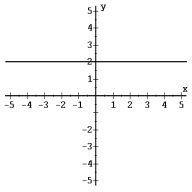
-


Unlock Deck
Unlock for access to all 319 flashcards in this deck.
Unlock Deck
k this deck
26
Determine whether the graph of each function is the graph of a one-to-one function.
-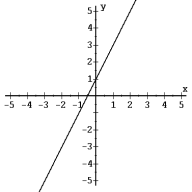
-


Unlock Deck
Unlock for access to all 319 flashcards in this deck.
Unlock Deck
k this deck
27
Determine whether the graph of each function is the graph of a one-to-one function.
-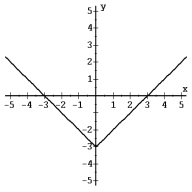
-


Unlock Deck
Unlock for access to all 319 flashcards in this deck.
Unlock Deck
k this deck
28
Determine whether the graph of each function is the graph of a one-to-one function.
-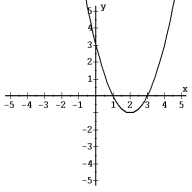
-


Unlock Deck
Unlock for access to all 319 flashcards in this deck.
Unlock Deck
k this deck
29
Determine whether the graph of each function is the graph of a one-to-one function.
-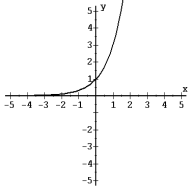
-


Unlock Deck
Unlock for access to all 319 flashcards in this deck.
Unlock Deck
k this deck
30
Determine whether the graph of each function is the graph of a one-to-one function.
-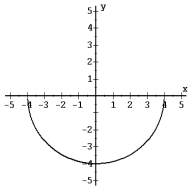
-


Unlock Deck
Unlock for access to all 319 flashcards in this deck.
Unlock Deck
k this deck
31
Each of the following functions is one-to-one. Find the inverse of each function.
-f ( x) = 3x + 4
-f ( x) = 3x + 4

Unlock Deck
Unlock for access to all 319 flashcards in this deck.
Unlock Deck
k this deck
32
Each of the following functions is one-to-one. Find the inverse of each function.
-f ( x) = 3 - 2 x
-f ( x) = 3 - 2 x

Unlock Deck
Unlock for access to all 319 flashcards in this deck.
Unlock Deck
k this deck
33
Each of the following functions is one-to-one. Find the inverse of each function.
-g( x) = 2x + 6
-g( x) = 2x + 6

Unlock Deck
Unlock for access to all 319 flashcards in this deck.
Unlock Deck
k this deck
34
Each of the following functions is one-to-one. Find the inverse of each function.
-g( x) = 4x - 8
-g( x) = 4x - 8

Unlock Deck
Unlock for access to all 319 flashcards in this deck.
Unlock Deck
k this deck
35
Each of the following functions is one-to-one. Find the inverse of each function.
-h( x) = x3 - 8
-h( x) = x3 - 8

Unlock Deck
Unlock for access to all 319 flashcards in this deck.
Unlock Deck
k this deck
36
Each of the following functions is one-to-one. Find the inverse of each function.
-
-

Unlock Deck
Unlock for access to all 319 flashcards in this deck.
Unlock Deck
k this deck
37
Each of the following functions is one-to-one. Find the inverse of each function.
-
-

Unlock Deck
Unlock for access to all 319 flashcards in this deck.
Unlock Deck
k this deck
38
Each of the following functions is one-to-one. Find the inverse of each function.
-
-

Unlock Deck
Unlock for access to all 319 flashcards in this deck.
Unlock Deck
k this deck
39
Each of the following functions is one-to-one. Find the inverse of each function.
-Graph f(x) = 5x - 3 and its inverse on the same axes.
-Graph f(x) = 5x - 3 and its inverse on the same axes.

Unlock Deck
Unlock for access to all 319 flashcards in this deck.
Unlock Deck
k this deck
40
Each of the following functions is one-to-one. Find the inverse of each function.
-Graph and its inverse on the same axes.
-Graph and its inverse on the same axes.

Unlock Deck
Unlock for access to all 319 flashcards in this deck.
Unlock Deck
k this deck
41
Graph each exponential function.
-
-

Unlock Deck
Unlock for access to all 319 flashcards in this deck.
Unlock Deck
k this deck
42
Graph each exponential function.
-
-

Unlock Deck
Unlock for access to all 319 flashcards in this deck.
Unlock Deck
k this deck
43
Graph each exponential function.
-
-

Unlock Deck
Unlock for access to all 319 flashcards in this deck.
Unlock Deck
k this deck
44
Graph each exponential function.
-
-

Unlock Deck
Unlock for access to all 319 flashcards in this deck.
Unlock Deck
k this deck
45
Graph each exponential function.
-
-

Unlock Deck
Unlock for access to all 319 flashcards in this deck.
Unlock Deck
k this deck
46
Graph each exponential function.
-
-

Unlock Deck
Unlock for access to all 319 flashcards in this deck.
Unlock Deck
k this deck
47
Graph each exponential function.
-
-

Unlock Deck
Unlock for access to all 319 flashcards in this deck.
Unlock Deck
k this deck
48
Graph each exponential function.
-
-

Unlock Deck
Unlock for access to all 319 flashcards in this deck.
Unlock Deck
k this deck
49
Graph each exponential function.
-
-

Unlock Deck
Unlock for access to all 319 flashcards in this deck.
Unlock Deck
k this deck
50
Graph each exponential function.
-
-

Unlock Deck
Unlock for access to all 319 flashcards in this deck.
Unlock Deck
k this deck
51
Solve
-
-

Unlock Deck
Unlock for access to all 319 flashcards in this deck.
Unlock Deck
k this deck
52
Solve
-
-

Unlock Deck
Unlock for access to all 319 flashcards in this deck.
Unlock Deck
k this deck
53
Solve
-
-

Unlock Deck
Unlock for access to all 319 flashcards in this deck.
Unlock Deck
k this deck
54
Solve
-
-

Unlock Deck
Unlock for access to all 319 flashcards in this deck.
Unlock Deck
k this deck
55
Solve
-
-

Unlock Deck
Unlock for access to all 319 flashcards in this deck.
Unlock Deck
k this deck
56
Solve
-
-

Unlock Deck
Unlock for access to all 319 flashcards in this deck.
Unlock Deck
k this deck
57
Solve
-
-

Unlock Deck
Unlock for access to all 319 flashcards in this deck.
Unlock Deck
k this deck
58
Solve
-
-

Unlock Deck
Unlock for access to all 319 flashcards in this deck.
Unlock Deck
k this deck
59
Solve
-The exponential function is a model for the population of a community x years after 1990. Predict the population for 2006
-The exponential function is a model for the population of a community x years after 1990. Predict the population for 2006

Unlock Deck
Unlock for access to all 319 flashcards in this deck.
Unlock Deck
k this deck
60
Solve
-Use to find the total investment if $10,000 is invested for one year at 12% compounded quarterly
-Use to find the total investment if $10,000 is invested for one year at 12% compounded quarterly

Unlock Deck
Unlock for access to all 319 flashcards in this deck.
Unlock Deck
k this deck
61
Use the exponential growth model to find the final amount after x years of exponential growth given the initial amount C, growth rate per year r, and the number of years x. Round final amounts to the nearest whole number.
-C = 800, r = 0.06, x = 4
-C = 800, r = 0.06, x = 4

Unlock Deck
Unlock for access to all 319 flashcards in this deck.
Unlock Deck
k this deck
62
Use the exponential growth model to find the final amount after x years of exponential growth given the initial amount C, growth rate per year r, and the number of years x. Round final amounts to the nearest whole number.
-C = 6700, r = 0.09, x = 36
-C = 6700, r = 0.09, x = 36

Unlock Deck
Unlock for access to all 319 flashcards in this deck.
Unlock Deck
k this deck
63
Use the exponential growth model to find the final amount after x years of exponential growth given the initial amount C, growth rate per year r, and the number of years x. Round final amounts to the nearest whole number.
-C = 43, r = 0.25, x = 22
-C = 43, r = 0.25, x = 22

Unlock Deck
Unlock for access to all 319 flashcards in this deck.
Unlock Deck
k this deck
64
Use the exponential growth model to find the final amount after x years of exponential growth given the initial amount C, growth rate per year r, and the number of years x. Round final amounts to the nearest whole number.
-Initial amount is 592, growth rate per year is 17%, and number of years is 52.
-Initial amount is 592, growth rate per year is 17%, and number of years is 52.

Unlock Deck
Unlock for access to all 319 flashcards in this deck.
Unlock Deck
k this deck
65
Use the exponential growth model to find the final amount after x years of exponential growth given the initial amount C, growth rate per year r, and the number of years x. Round final amounts to the nearest whole number.
-Initial amount is 3500, growth rate per year is 2%, and number of years is 75.
-Initial amount is 3500, growth rate per year is 2%, and number of years is 75.

Unlock Deck
Unlock for access to all 319 flashcards in this deck.
Unlock Deck
k this deck
66
Use the exponential growth model to find the final amount after x years of exponential growth given the initial amount C, growth rate per year r, and the number of years x. Round final amounts to the nearest whole number.
-Initial amount is 45, growth rate per year is 30%, and number of years is 16
-Initial amount is 45, growth rate per year is 30%, and number of years is 16

Unlock Deck
Unlock for access to all 319 flashcards in this deck.
Unlock Deck
k this deck
67
Use the exponential decay model to find the final amount after x years of exponential decay given the initial amount C, decay rate per year r, and the number of years x. Round final amounts to the nearest whole number.
-C = 800, r = 0.06, x = 4
-C = 800, r = 0.06, x = 4

Unlock Deck
Unlock for access to all 319 flashcards in this deck.
Unlock Deck
k this deck
68
Use the exponential decay model to find the final amount after x years of exponential decay given the initial amount C, decay rate per year r, and the number of years x. Round final amounts to the nearest whole number.
-C = 6700, r = 0.09, x = 36
-C = 6700, r = 0.09, x = 36

Unlock Deck
Unlock for access to all 319 flashcards in this deck.
Unlock Deck
k this deck
69
Use the exponential decay model to find the final amount after x years of exponential decay given the initial amount C, decay rate per year r, and the number of years x. Round final amounts to the nearest whole number.
-C = 3000, r = 0.5, x = 8
-C = 3000, r = 0.5, x = 8

Unlock Deck
Unlock for access to all 319 flashcards in this deck.
Unlock Deck
k this deck
70
Use the exponential decay model to find the final amount after x years of exponential decay given the initial amount C, decay rate per year r, and the number of years x. Round final amounts to the nearest whole number.
-Initial amount is 9200, decay rate per year is 13%, and number of years is 40.
-Initial amount is 9200, decay rate per year is 13%, and number of years is 40.

Unlock Deck
Unlock for access to all 319 flashcards in this deck.
Unlock Deck
k this deck
71
Use the exponential decay model to find the final amount after x years of exponential decay given the initial amount C, decay rate per year r, and the number of years x. Round final amounts to the nearest whole number.
-Initial amount is 70,000, decay rate per year is 10%, and number of years is 18.
-Initial amount is 70,000, decay rate per year is 10%, and number of years is 18.

Unlock Deck
Unlock for access to all 319 flashcards in this deck.
Unlock Deck
k this deck
72
Use the exponential decay model to find the final amount after x years of exponential decay given the initial amount C, decay rate per year r, and the number of years x. Round final amounts to the nearest whole number.
-Initial amount is 32,000, decay rate per year is 5%, and number of years is 84.
-Initial amount is 32,000, decay rate per year is 5%, and number of years is 84.

Unlock Deck
Unlock for access to all 319 flashcards in this deck.
Unlock Deck
k this deck
73
Solve. Round answers to the nearest whole number.
-Suppose a city with population 200,000 has been growing at a rate of 2% per year. If this rate continues, find the population of the city in 16 years.
-Suppose a city with population 200,000 has been growing at a rate of 2% per year. If this rate continues, find the population of the city in 16 years.

Unlock Deck
Unlock for access to all 319 flashcards in this deck.
Unlock Deck
k this deck
74
Solve. Round answers to the nearest whole number.
-Suppose a city with population 450,000 has been shrinking at a rate of 1.5% per year. If this rate continues, find the population of the city in 30 years.
-Suppose a city with population 450,000 has been shrinking at a rate of 1.5% per year. If this rate continues, find the population of the city in 30 years.

Unlock Deck
Unlock for access to all 319 flashcards in this deck.
Unlock Deck
k this deck
75
Solve. Round answers to the nearest whole number.
-The number of consumers in a certain area who subscribe to residential telephone service has been decreasing each year by 12%. If there are currently 13,000 subscribers in this area, find the number of subscribers in 5 years.
-The number of consumers in a certain area who subscribe to residential telephone service has been decreasing each year by 12%. If there are currently 13,000 subscribers in this area, find the number of subscribers in 5 years.

Unlock Deck
Unlock for access to all 319 flashcards in this deck.
Unlock Deck
k this deck
76
Solve. Round answers to the nearest whole number.
-At a certain college, the number of students who utilize career placement services is growing at a rate of 4% per year. If the number of students who currently use career placement services is 2800, find how many students should use these services in 8 years.
-At a certain college, the number of students who utilize career placement services is growing at a rate of 4% per year. If the number of students who currently use career placement services is 2800, find how many students should use these services in 8 years.

Unlock Deck
Unlock for access to all 319 flashcards in this deck.
Unlock Deck
k this deck
77
Solve. Round answers to the nearest whole number.
-The size of the jackrabbit population in a prairie preserve area grows at a rate of 11% per year. If there are 132 jackrabbits currently, find how many jackrabbits there should be in 4 years.
-The size of the jackrabbit population in a prairie preserve area grows at a rate of 11% per year. If there are 132 jackrabbits currently, find how many jackrabbits there should be in 4 years.

Unlock Deck
Unlock for access to all 319 flashcards in this deck.
Unlock Deck
k this deck
78
Solve. Round answers to the nearest whole number.
-The size of the cod population off the coast of New England declines at a rate of 8.5% per year. If the population is currently 400,000, find how many cod there should be in 12 years.
-The size of the cod population off the coast of New England declines at a rate of 8.5% per year. If the population is currently 400,000, find how many cod there should be in 12 years.

Unlock Deck
Unlock for access to all 319 flashcards in this deck.
Unlock Deck
k this deck
79
Solve. Round answers to the nearest tenth.
-A form of sodium has a half-life of 2.6 years. How much of a 600-gram sample is left after 13 years?
-A form of sodium has a half-life of 2.6 years. How much of a 600-gram sample is left after 13 years?

Unlock Deck
Unlock for access to all 319 flashcards in this deck.
Unlock Deck
k this deck
80
Solve. Round answers to the nearest tenth.
-A form of magnesium has a half-life of 21 hours. How much of a 900-gram sample is left after 252 hours?
-A form of magnesium has a half-life of 21 hours. How much of a 900-gram sample is left after 252 hours?

Unlock Deck
Unlock for access to all 319 flashcards in this deck.
Unlock Deck
k this deck



